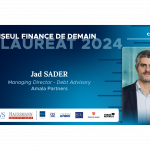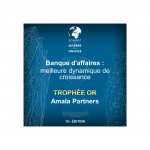Amala Partners finds it way in PE thanks to the GPS
Nicolas de Nazelle interview
Hello Nicolas, could you give us a quick background of your professional life?
My mother is American and my father French, I was raised in both cultures and countries. After my MBA in New York, I quite naturally began my professional career in the United States, first at JP Morgan Chase in leveraged finance and then at Société Générale in their senior banking coverage team where I had the privilege of carrying out a fairly complete tour of the various business lines of investment banking.
Why did you make it back to France?
After more than 10 years in New York and a first professional experience in two major banks, I came bacck to France to find a more intimate environment. I wanted to continue working in finance but not as a banker. Private equity naturally came to mind, because it combines finance and, as some say today, real businesses! I was very fortunate to advise an entrepreneur friend who was looking to buyout the drug manufacturing plant he managed at the time. For several weeks, I accompanied him in the preparation of his MBO. Today, and a few LBOs later, Delpharm is one of the European leaders in CDMO and I like to think that my modest contribution will have started the adventure of the entrepreneurs who made this success possible.
You then joined a Private Equity fund.
Following this assignment, I joined Avesta Partners, a private equity fund that was spinning-off from UBS Capital where the team had operated for several years. It was my first experience with a “first time fund”. I had two main jobs, first managing the portfolio companies and second coordinating fundraising with our placement agent. I had the luck and misfortune to live a complete life cycle of a management company, from its birth to its end since Avesta Partners ultimately failed to achieve its fundraising goal. I have never learned as much as during these two and a half years. One of the main lessons from this adventure is that without team cohesion and without a clear vision of its mission, the success of a company relies to heavily on luck! The second lesson was that getting independent and honest advice is more powerful that a full team of “yes-men”. Our agent, though a well-established firm in London, was probably too complacent and expected, in a sense, that the law of numbers would do its job. We met hundreds of investors but our story has not been properly written from the start.
You then transitioned to the placement agent role. What was your role at Triago?
Needless to say, after my first experience with a placement agent, I did not have a high regard for the profession. What made me change my mind was my encounter with Antoine Dréan who had founded Triago 10 years earlier. I was immediately attracted by the entrepreneur. Moreover, Triago was looking to develop a nascent practice: secondary market advisory. At that time, I didn’t even know that it was possible to sell back LP commitments in private equity funds. In 2005, the market was still very confidential, if not unknown. Oddly enough, one of my very first transactions was a continuation fund for Bridgepoint. I think it was the first such transaction in Europe at the time. We had called it “synthetic secondary transaction”! For me, it was basically a blank sheet of paper. In less than 10 years, Triago quickly became a major player in the market. During my 17 years at Triago, I had the chance and privilege to work on so many opportunities, whether it was secondary operations, primary fundraising – and especially first time funds! – or strategic missions for our European and American managers. For many years I also covered the United States before the New York eventually became the largest offices. My luck was that I basically grew-up in the asset class at the same time as it experienced this tremendous growth. Now, Private Equity is entering a new phase, with many new challenges.
Indeed, the world is changing and the profession with it… What are the main developments that have particularly marked you?
There have been many developments, but what particularly stands out to me is the profound evolution of the LP/GP relationship, i.e. the relationship between private equity fund investors and private equity managers. This evolution was in fact initiated by LPs which, for the largest and most active in particular, are no longer as “limited” in their role as their name could suggest. The divide line between the two roles is more blurred: LPs co-invest with their managers or with managers in which they are not investors, LPs finance secondary operations or invest directly in assets or through SPVs. On the GP side, the big evolution is that of the emergence of platforms. This started before the great crisis of 2008/2009 but it has clearly accelerated in Europe over the past 10 years. We sometimes hear LPs express concerns about the benefits of platforms, but the fact is that today it is more difficult to operate with little AUM (money under management) than, say, 10-15 years ago. The costs of operating a fund have increased to keep up with the demand in terms of regulation, control, reporting or ESG for example. The good news is that the asset class continues to outperform most other asset classes. In large part because there are still, and will continue to be, talented managers, savvy investors and great companies to finance.
Why join Amala, which today operates more as an investment bank than as a placement agent?
Indeed, it may come as a surprise at first. In reality, it is totally consistent with the changing needs of the market. Moreover, many American banks have started to acquire placement agents and this movement to integrate fundraising advisory activities (primary market), liquidity (secondary market) and strategic advice (GP stake, GP financing, M&A) within banks is only beginning. Now, for Amala in particular, it is again an encounter, with Jean-Baptiste and his associates who share the same desires, vision and values as me. Amala is the investment banking advisor for entrepreneurs and investors in the non-listed space. They operate with a merchant bank approach. For the past twenty years, its partners and collaborators have built a virtuous ecosystem, allowing companies to grow and investors to finance beautiful entrepreneurial stories. My job, as a placement agent, initially consisted in positioning products and distributing them to identified investors by telling great stories. It is now much more transactional and requires more sophisticated skills. In a way, it’s more technical than it was before, bringing me back to my years as a banker and a GP! As advisors, we can address much more complex matters and the solutions we can offer to help grow managers and offer attractive investment opportunities has changed significantly. Whether it is fundraising or find capital on a deal-by-deal basis (single asset SPV), structuring liquidity solutions (tail-end fund liquidity, continuation fund and other GP-led), or helping GP with their business development objectives (GP-stake, GP M&A, platform etc.). To offer the proper support, it requires a deeper bench of experts. With Amala GPS, we aims to offer GPs the most complete toolbox possible to support them throughout the life cycle of their company.
So what can we wish for you in the years to come?
To be the best at what we do and to continue to offer an honest and effective support to your clients. Amala is still a young merchant banking advisory shop.
We are building the firm brick by brick with excellence as the first criterion and a principal mindset as our philosophy. I feel very privileged to join such a dynamic and demanding team at a time when our industry is, in my opinion, reaching a next stage of its development.
A beautiful project full of ambition! The Amala moto on your website says “For a daring future”. What does that inspire you?
We mention boldness as one of our important values. In French, the word is also Audacity. Without audacity, no enterprise can start. As an advisor to entrepreneurs, Amala fully engages in this bold future. Being bold does not mean being reckless or carefree, on the contrary, audacity requires full awareness of one’s environment and an excellent mastery of its inner workings. And, last but not least, we take a long-term approach on everything we do. I think time is one of Private Equity’s most important asset. So, yes, we stand for a Daring Future… and a long life!





